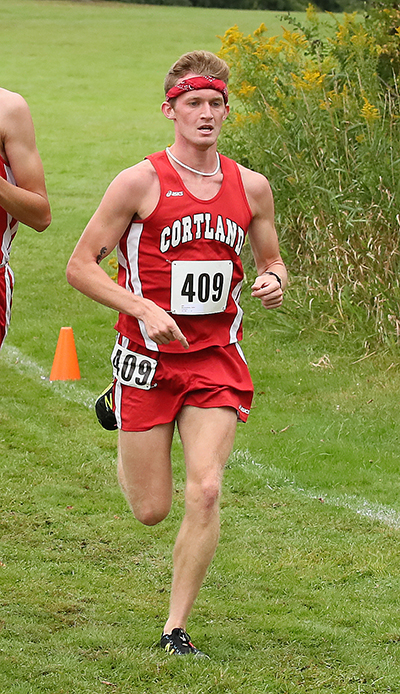Cabel McCandless was a straight-A student and talented distance runner in high school. He also was a voracious reader who enjoyed achieving his goals in competition and in the classroom. When he arrived at SUNY Cortland in 2016, he saw the College as the intersection of his academic and athletic interests.
“I thought that studying the human body as a major could be really interesting,” said McCandless, an exercise science major and member of the College’s cross country and track and field teams. “But I’ll be honest. When I first was looking at colleges, I thought Cortland was strongest at sports.”

Through the College’s Honors Program, however, he discovered a higher level of learning that far exceeded his expectations. The Lindenhurst, N.Y., native joined a close-knit and curious student community that has proven just as meaningful as a varsity team.
McCandless is on track to earn his bachelor’s degree in just three years. After that, he hopes to pursue his master’s degree at the College and eventually continue on to a Ph.D. He recently spoke about his experience in the Honors Program to help provide an accurate snapshot for prospective members.
Q: If you had to describe your Honors Program experience in one word, what would it be?
“Eye-opening. When I was first looking into Cortland, I was thinking everyone there is interested in sports or sport-related majors like me. But then you go into the Honors Program and you realize how many smart people there are across all majors. You go and hear about the projects other people are working on, and there’s some incredible stuff happening across all departments. I see both sides of it — athletics and academics — and I know that academics are just as strong as athletics at Cortland. It’s eye-opening.”
Q: Describe a specific “eye-opening” experience for you.
“We sat down as a precursor to the thesis course, maybe 20 or so kids, and we all said our major. There were students from everywhere — education, art, history, anthropology, psychology, exercise science, sport management. Everyone was working on a different project. Just to hear about different majors doing different things that all look to benefit society, that’s when it clicked for me: ‘This is bigger and better than I imagined.’”
Q: Why did you choose to pursue the Honors Program initially?
“(Program Director) Frank Rossi explained it to me. It sounded like a really cool thing — taking special classes to open your worldview. When I heard about the thesis portion, that slowly triggered my interest in research, this idea of exploring something in my field and presenting it. I thought the Honors Program would make me work harder and step out of my comfort zone in higher-level courses.”
Q: You mentioned the thesis project. How has that been?
“When you first hear ‘thesis,’ it catches you in a scary way. But the program handles it perfectly. There’s a specific thesis class every semester. Professors help you with the writing, the research and the funding. They lay it all out for you and help you create a timeline. So whether you’re working on a paper, lab research, a novel — however you interpret it — it’s flexible. It’s also a great way to kick start your career if you’re thinking about graduate school. My advisor is (Assistant Professor of Kinesiology) Mark Sutherlin and I’m also working with (Associate Professor of Kinesiology) Jim Hokanson.”
Q: How would you describe your own project?
“We’re looking at different training methods for 100-meter track runners with visual impairments. Right now, the only system being used is a buddy system where runners are tethered to another runner with full vision. There’s just flaws with that system. The buddy runner could be disqualified or get hurt, and that could hinder the para-athlete’s ability to run in the race. Runners with visual impairments are too dependent on their partner, so we’re looking to make them more independent through a hearing component. We’re trying to make para-athletes more of an individual.”
Q: What would you say about the workload associated with the Honors Program?
“It’s definitely hefty, but it’s manageable. Professors know what they’re giving you and they know what you’re capable of doing. It’s not impossible at all. You just have to expect the workload. You have to put your nose in it like anything else you care about.”
Q: Have you met other students through the Honors Program who you wouldn’t normally meet?
“One hundred percent. Being on a sports team, obviously I’m friends with my teammates. But being in the Honors Program, I’ve met so many people who I might not have met otherwise. They’re some of my very best friends on campus. And they’re different majors — art majors, education majors, everyone.”
Q: What’s something that you think prospective students should know about the Honors Program?
“You have to be ready to work. You have to want to work. There are people and professors who are willing and ready to work with you, but you have to be ready to work with them. It really is a great system.”